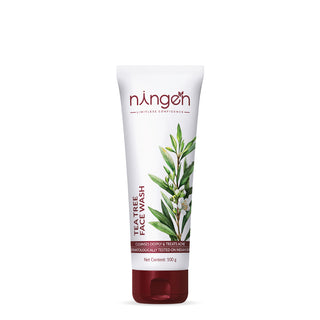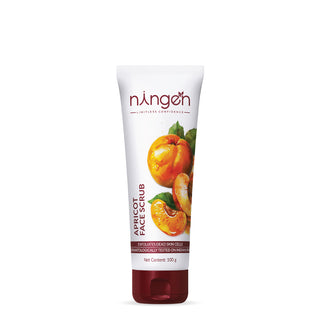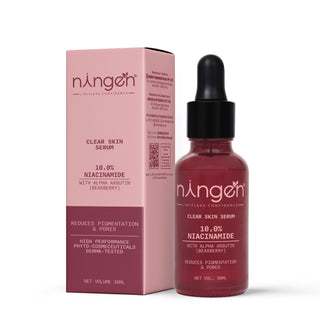Hey there, skincare enthusiasts! It's time to give your skin some extra TLC!
Yes. As the temperatures rise and the days get longer, it brings with it a unique set of challenges for maintaining a healthy complexion. That's right, we're diving into the world of summer skincare routine– because who doesn't want that effortless summer glow, right?
So, grab your favorite drink, sit back, and start reading this article, as we're about to break down the ultimate step-by-step guide to achieving radiant summer skin.
Heat and humidity can ramp up oil production, while air conditioning can dry you out. This article offers a tailored summer skincare plan. Learn how to adjust your routines, address seasonal concerns, and keep your skin glowing all summer long.
In This Article;
- Understanding the Impact of Summer Weather on Your Skin
- Morning Skincare Routine for Summer
- Evening Skincare Routine for Summer
- Dealing With Skin Concerns in The Summer
- Additional Summer Skincare Tips
- The bottom Line
- TL;DR(Too Long; Didn't Read)
- Frequently Asked Questions
Understanding the Impact of Summer Weather on Your Skin
As the seasons change, it's not just your wardrobe that requires a transition — your skin also feels the impact, particularly during the sweltering summer months. This period brings with it a host of challenges for keeping skin healthy and hydrated. The increased temperatures, higher humidity levels, and intensified UV exposure can all have pronounced effects on your skin's health and appearance.
The Effect of Hot Weather on the Skin
The summer weather can cause a myriad of reactions in different skin types.
For those with oily skin, the heat often exacerbates oil production, leading to a shiny complexion and potential breakouts.
Conversely, individuals with dry skin may find the summer heat drying, resulting in a tight and uncomfortable feeling. Regardless of your skin type, everyone is subject to the harmful effects of UV exposure which can accelerate premature aging and increase the risk of skin cancer.
Prolonged exposure to hot weather can also weaken the skin barrier, the layer of protection responsible for keeping skin hydrated and shielding it from irritants. When this barrier is compromised, you may experience increased sensitivity leading to red, irritated, or sunburned skin. Moreover, an uneven skin tone can develop due to an increase in melanin production as a natural reaction to protect the skin from UV damage.
Why Your Skincare Routine Needs to Change in the Summer
In summer, your skincare routine should adapt to combat increased oil production, dehydration, and sun exposure. Switch to lightweight moisturizers with hydrating ingredients like hyaluronic acid and opt for Salicylic acid cleansers to keep skin fresh. Use broad-spectrum sunscreen daily to shield against UV damage and consider tinted moisturizers for added protection. Incorporating Vitamin C can combat oxidative stress and uneven skin tone caused by the sun. Adjusting shower temperature and outdoor activities can further protect your skin. With these changes, your summer skincare routine will keep your complexion healthy and glowing.
Morning Skincare Routine for Summer
Here's a simplified morning skincare routine tailored for the summer months:
- Cleanse: Start your day by washing your face with a gentle cleanser to remove sweat, oil, and impurities that may have accumulated overnight. Look for a cleanser suitable for your skin type, whether it's oily, combination, dry, or sensitive.
- Tone: After cleansing, apply a toner to balance your skin's pH levels and prep it for better absorption of subsequent products. Opt for a refreshing toner with ingredients like witch hazel or rose water to soothe and hydrate your skin.
- Serum: Do not forget to apply serum according to your skin concerns, whether it's dark spots, hydration, exfoliation, or reducing wrinkles.
- Moisturize: Hydration is key, even in the summer. Choose a lightweight, oil-free moisturizer that provides ample hydration without feeling heavy on the skin. Look for ingredients like hyaluronic acid or glycerin to lock in moisture and keep your skin plump and supple throughout the day.
- Sun Protection: Sunscreen is non-negotiable, regardless of the season. Apply a broad-spectrum sunscreen with at least SPF 30 to protect your skin from harmful UV rays. Reapply every two hours if you'll be spending extended periods outdoors.
- Eye Cream: Don't forget the delicate skin around your eyes. Apply a lightweight eye cream with SPF to protect against sun damage and minimize the appearance of fine lines and dark circles.
- Lip Balm: Finish off your morning routine with a hydrating lip balm containing SPF to shield your lips from the sun's harsh rays and keep them soft and moisturized throughout the day.
By following this simple morning skincare routine, you can keep your skin healthy, hydrated, and protected from the summer elements. Adjust products based on your skin type and concerns for optimal results.
Here's a simple table to summarize your summer morning skincare steps:
|
Step |
Purpose |
Product Suggestion |
|
Cleanse |
Remove impurities |
Gentle Cleanser |
|
Moisturize |
Hydrate skin |
Lightweight Moisturizer with Hyaluronic Acid |
|
Treat |
Address specific concerns |
Vitamin C Serum/Salicylic Acid |
|
Protect |
Guard against UV exposure |
Broad-spectrum sunscreen SPF 30+ |
Evening Skincare Routine for Summer
Here's a relaxing evening skincare routine tailored for the summer season:
- Double Cleanse: Start by thoroughly removing makeup, sunscreen, and impurities with an oil-based cleanser. Follow up with a gentle water-based cleanser to cleanse your skin without stripping away its natural oils.
- Exfoliate: Use a gentle exfoliator 2-3 times a week to slough off dead skin cells, unclog pores, and reveal a smoother, brighter complexion. Look for exfoliants containing ingredients like AHAs (alpha hydroxy acids) or BHAs (beta hydroxy acids) to promote cell turnover and keep your skin clear and radiant.
- Tone: After cleansing, apply a hydrating toner to rebalance your skin's pH levels and prep it for better absorption of serums and moisturizers. Opt for an alcohol-free toner with soothing ingredients like aloe vera or cucumber to calm and refresh your skin.
- Treat: If you have specific skincare concerns like acne, hyperpigmentation, or fine lines, now is the time to apply targeted treatments. Use serums or treatments containing potent ingredients like vitamin C, niacinamide, or retinol to address these concerns and promote skin health.
- Hydrate: Lock in moisture and nourish your skin with a lightweight yet hydrating moisturizer. Choose a formula that's suitable for your skin type and provides ample hydration without feeling greasy or heavy.
- Eye Cream: Gently pat a nourishing eye cream around the delicate eye area to hydrate, firm, and brighten the skin. Look for eye creams containing peptides, hyaluronic acid, or vitamin E to address common eye concerns like dark circles and puffiness.
- Lip Care: Don't forget to pamper your lips with a nourishing lip balm or treatment to keep them soft, smooth, and hydrated overnight.
- Sleep Mask (Optional): For an extra boost of hydration and repair, apply a hydrating sleep mask or overnight treatment to lock in moisture and wake up to plump, refreshed skin.
By following this evening skincare routine, you can help repair and rejuvenate your skin while you sleep, ensuring you wake up with a healthy, glowing complexion every morning. Adjust products based on your skin's needs and concerns for optimal results.
Dealing With Skin Concerns in The Summer
As temperatures climb in the summer months, adjusting your skincare routine is key to keeping your skin healthy and hydrated. No matter your skin type—dry, oily, or a combination—it's essential to choose products that match your needs.
Additional Summer Skincare Tips
- Stay Cool: Use lukewarm water when washing your face to avoid irritation.
- Vitamin C: Incorporate Vitamin C into your routine to help with uneven skin tone.
- Non-comedogenic: Choose non-comedogenic products to prevent clogged pores, especially important in hot weather.
- Rehydrate: Keep your skin barrier intact by reapplying moisturizer and sunscreen throughout the day.
Be mindful of direct sun exposure and wear protective clothing to guard against sunburned skin. Adapting your skincare routine with these tips can help address summer weather-specific skin concerns like irritation or an uneven skin tone.
Addressing Oily Skin and Breakouts with Salicylic Acid
As the summer heat intensifies, those with oily skin may notice an uptick in breakouts. The combination of the summer months' hot weather and increased UV exposure can exacerbate oily skin concerns, leading to more pronounced acne. Salicylic acid is a proven ally in the battle against these seasonal skin woes. This beta-hydroxy acid is exceptional at penetrating and unclogging pores, removing the buildup of dead skin cells, and managing the overproduction of sebum which commonly occurs in warmer climates.
For a clearer complexion, consider incorporating a cleanser or treatment containing salicylic acid into your summer skincare routine. Salicylic acid not only helps to keep the skin clean and clear by combating existing blemishes, but it also aids in preventing new ones from forming. It's a powerful ingredient for maintaining healthy skin, especially when faced with the challenge of oily skin during the summer months.
Summer Skincare Tip for Oily Skin:
- Active Ingredient: Salicylic acid
- Purpose: Unclogs pores, removes dead skin cells, reduces sebum
- Use: Look for cleansers or spot treatments that list salicylic acid.
Remember, always follow up with a layer of protection such as a non-comedogenic, lightweight moisturizer with SPF to defend against direct sun exposure and reduce the risk of skin cancer and premature aging.
Protecting Your Skin From the Sun
In summer, our skin faces increased UV exposure, heightening skin cancer risks and the potential for premature aging. It's crucial to adapt our skincare routine to prevent damage during these warmer months.
- Use Sunscreen Daily: Opt for a broad-spectrum sunscreen, SPF 30 or higher, which offers protection against UVA and UVB rays. Reapply every two hours, or more often if swimming or sweating.
- Wear Protective Clothing: Clothes can provide an additional layer of protection. Long-sleeved shirts, pants, wide-brimmed hats, and sunglasses are effective against direct sun exposure.
- Seek Shade: During peak sun intensity, typically from 10 a.m. to 4 p.m., find shelter under umbrellas or trees.
- Be Mindful of Reflective Surfaces: Water, sand, and concrete can reflect UV rays, increasing exposure. Apply protective measures even when you're under an umbrella.
- Use Extra Care Near Water and Sand: These environments can amplify sun exposure. Apply a water-resistant sunscreen liberally and frequently.
- Avoid Tanning Beds: They increase the risk of skin cancer and cause skin damage.
Remember, a consistent and protective skincare routine can help maintain healthy skin throughout the hot weather. Stay hydrated, use a lightweight moisturizer, and pay attention to your skin type and concerns to keep your skin radiant and shielded.
Preventing Premature Aging with Vitamin C
Premature aging is a common concern during the summer months when the sun is at its strongest. One of the best preventative measures you can take is incorporating Vitamin C into your skincare routine. This powerful antioxidant helps combat free radical damage, a key factor in the visible aging process. Additionally, Vitamin C can help to even out your skin tone and promote collagen production, leading to firmer, more youthful skin.
To get the maximum benefits, look for serums or moisturizers enriched with Vitamin C and apply them in the morning before sunscreen. This not only helps protect your skin against UV-induced damage but also amplifies the efficacy of your SPF. Remember to store Vitamin C products away from direct sunlight to preserve their potency.
Understanding Non-Comedogenic Products for Acne-Prone Skin
For those with oily or acne-prone skin, summer's heat and humidity can exacerbate skin concerns. The term "non-comedogenic" is a staple in skincare lingo, referring to products formulated to not clog pores. Clogged pores can lead to acne, making non-comedogenic products an essential aspect of a summer skincare routine for those susceptible to breakouts.
When choosing such products, check for labels that indicate they are oil-free or non-comedogenic. This includes cleansers, moisturizers, and makeup. Ingredients like Salicylic acid are often found in these products, which help to gently exfoliate dead skin cells and keep the skin clean. Remember, even though you want to avoid heavy products, don't skip moisturizer entirely; opt for a lightweight, oil-free version to maintain your skin's hydration balance.
Strengthening Your Skin Barrier for Improved Health
The skin barrier is your body's first line of defense against environmental aggressors. In the summer, this barrier is often compromised due to increased sweat, chlorine from pools, and prolonged sun exposure. A compromised skin barrier can lead to dehydration, irritated skin, and heightened sensitivity.
To strengthen your skin barrier, emphasize hydration and repair. Look for ingredients like hyaluronic acid that attract moisture to the skin, and ceramides, which help rebuild the skin's barrier. Lukewarm water is ideal for cleansing as hot water can strip away natural oils from the skin. After cleansing, immediately apply a hydrating serum or moisturizer to damp skin to lock in moisture. Avoid harsh exfoliants or astringents that can further strip the skin barrier and instead opt for gentle exfoliation.
By following these guidelines and tailoring your skincare routine to the challenges of summer weather, you can help protect your skin against potential damage and ensure it remains clean, hydrated, and healthy.
Caring for Sunburned and Irritated Skin
Caring for sunburned and irritated skin during the summer months requires gentle attention and the right products to soothe discomfort and facilitate healing. Here’s a concise guide to help you deal with the harsh effects of summer weather:
- Cool Down: Start by cooling the affected area with a damp cloth or take a bath with lukewarm water. Avoid extreme temperatures as they can exacerbate irritation.
- Hydrate Your Skin: Use a lightweight moisturizer enriched with hyaluronic acid to keep the skin hydrated without clogging pores.
- Soothe with Aloe: Aloe vera is known for its calming properties. Apply a pure aloe gel to the sunburned skin for relief.
- Avoid Harsh Chemicals: Stay clear of products containing Salicylic acid or alcohol which can further irritate the skin.
- Protect: Once your skin has started to heal, ensure to apply a layer of protection against UV exposure with a broad-spectrum sunscreen, and consider wearing protective clothing.
The key to a healthy skin barrier is consistency in your skincare routine and opting for non-comedogenic products that won’t irritate your skin. If your skin concerns persist, consult a dermatologist to address your specific skin type and prevent premature aging and the risk of skin cancer.
|
Step |
Action |
Product Suggestion |
|
1 |
Cool down the skin |
Damp cloth, lukewarm water |
|
2 |
Hydrate |
Lightweight moisturizer with hyaluronic acid |
|
3 |
Soothe |
Aloe vera gel |
|
4 |
Protect (post-healing) |
Broad-spectrum sunscreen |
Explore our handpicked collection of recommended summer skincare products in the designated area.
The bottom Line
Hope you found our article on summer skincare routine helpful. Glowing summer skin is within reach with a few simple adjustments to your skincare routine. By understanding how summer weather affects your skin and making small changes like using sunscreen, staying hydrated, and treating specific concerns, you can maintain a healthy, radiant complexion all season long. Embrace the simplicity of summer skincare and let your natural glow shine through. Here's to happy, healthy skin and a summer full of sunshine!
Achieving glowing summer skin is simple with the right skincare routine adjustments. As temperatures rise, adjust your routine to combat increased oil production, dehydration, and sun exposure. Use lightweight moisturizers, sunscreen, and incorporate Vitamin C for added protection. Tailor morning and evening routines accordingly, and address specific concerns like oily skin with ingredients like salicylic acid. Remember to protect your skin from the sun's harmful rays and stay hydrated from the inside out. With these tips, enjoy healthy, radiant skin all summer long!
Frequently Asked Questions
Question 1: How does summer weather affect my skin, and what are the common challenges?Answer: Summer weather can lead to increased oil production, dehydration, sunburn, and sensitivity due to higher temperatures, humidity, and UV exposure. Common challenges include oily skin, dryness, sunburn, and irritation.
Question 2: Should I use a different type of moisturizer in the summer?
Answer: Yes, opt for lightweight, oil-free moisturizers with ingredients like hyaluronic acid or glycerin to hydrate without feeling heavy. These help maintain moisture balance without clogging pores in the heat.
Question 3: How important is sunscreen during the summer, and what SPF should I use?
Answer: Sunscreen is crucial year-round, but especially in summer. Choose a broad-spectrum sunscreen with SPF 30 or higher to protect against UVA and UVB rays. Reapply every two hours, or more often if swimming or sweating.
Question 4: Can I still use serums and treatments in the summer, or should I simplify my routine?
Answer: Yes, you can still use serums and treatments in the summer. Look for lightweight formulas with ingredients like vitamin C or niacinamide to address specific concerns like uneven skin tone or hyperpigmentation.
Question 5: How often should I exfoliate my skin in the summer, and what type of exfoliant is best?
Answer: Limit exfoliation to 2-3 times a week using gentle exfoliants containing AHAs or BHAs to remove dead skin cells and unclog pores. Avoid over-exfoliating, which can increase sensitivity.
Question 6: Are there specific ingredients I should avoid in my skincare products during the summer?
Answer: Avoid heavy, pore-clogging ingredients like mineral oil or petrolatum. Instead, opt for non-comedogenic, oil-free formulas to prevent breakouts and keep pores clear.
Question 7: What should I do if I have oily skin and am prone to breakouts during the summer?
Answer: Use products containing ingredients like salicylic acid to control oil production and prevent breakouts. Cleanse regularly, avoid heavy moisturizers, and choose oil-free, non-comedogenic products.
Question 8: Can I wear makeup during the summer without clogging my pores?
Answer: Yes, choose oil-free, non-comedogenic makeup products formulated for summer. Look for lightweight foundations, mattifying powders, and oil-free primers to keep pores clear and prevent breakouts.
Question 9: How can I keep my skin hydrated and glowing during hot weather without making it feel greasy?
Answer: Hydrate your skin with lightweight, water-based moisturizers containing ingredients like hyaluronic acid. Drink plenty of water, use hydrating mists throughout the day, and avoid heavy, occlusive products.











